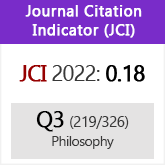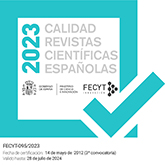How to Deal with Naturalistic Fallacy Accusations
DOI:
https://doi.org/10.3989/isegoria.2023.69.06Keywords:
Naturalism, Metaethics, Naturalistic fallacy, Moore, HumeAbstract
Given the philosophical relevance and the existence of heated discussions about naturalistic fallacy, it is obligatory for any system of naturalistic ethics to give some answer about how it overcomes potential imputations of naturalistic fallacy. At this point, two strategies can be used to defend against the charge of fallacy: one of them is arguing against the relevance of the charge in general, by showing that the description of the fallacy fails to point to something problematic in naturalistic arguments, and another by showing that the proposition of naturalism in favor of which one argues is not affected by the charges of fallacy. This article will offer an analysis of the different conceptions of naturalistic fallacies that have been described and will take both routes to defend the proposition proper to each recognized type of naturalistic fallacy.
Downloads
References
Bloom, P. (2013). Just Babies, the Origins of Good and Evil. New York: Brodway Books.
Corrales Pavía, H. (2023). Hacia una autodefinición de naturalismo. Revista de Humanidades de Valparaíso, 21, 7-26. https://doi.org/10.22370/rhv2023iss21pp7-26
Curry, O. (2006). Who's Afraid of the Naturalistic Fallacy? Evolutionary Psychology, 4(1), 234-247. https://doi.org/10.1177/147470490600400120
De Caro, M. y Voltolini, A. (2010). Is Liberal Naturalism Possible? En M. De Caro y D. Macarthur (Eds.), Naturalism and Normativity (pp. 69-86). Columbia: Columbia University Press.
De Waal, F. (2005). El mono que llevamos dentro. Barcelona: Tusquests.
De Waal, F. (2015). La edad de la empatía. ¿Somos altruistas por naturaleza? Barcelona: Tusquets.
De Waal, F. (2016). El bonobo y los diez mandamientos. Barcelona: Tusquests.
Diéguez, A. (2010). El argumento de Alvin Plantinga contra el naturalismo evolucionista: un análisis crítico. Éndoxa, 1(24), 333-349. https://doi.org/10.5944/endoxa.24.2010.5222
Diéguez, A. (2014). Delimitación y defensa del naturalismo (en la ciencia y en la filosofía). En R. Gutierrez-Lombardo y J. Sanmartín (Eds.), La filosofía desde la ciencia (pp. 21-49). México: Centro de Estudios Filosóficos, Políticos y Sociales Vicente Lombardo Toledano.
Frankena, W. K. (1974). La falacia naturalista. En P. Foot (Ed.), Teorías sobre la ética (pp. 80-98). Madrid: Alianza.
Gascón, J. Á. (2021). El problema de las falacias: objeciones a la utilidad de un concepto teórico. Cogency, 13 (1), 125-146. https://doi.org/10.32995/cogency.v13i1.372
Habermas, J. (2003). The Future of Human Nature. Cambridge: Polity Press.
Haidt, J. (2001). The Emotional Dog and Its Rational Tail: A Social Intuitionist Approach to Moral Judgment. Psychological Review, 108(4), 814-834. https://doi.org/10.1037/0033-295X.108.4.814 PMid:11699120
Haidt, J. (2013). The righteous mind. Why Good People are Divided by Politics and Religion. Nueva York: Penguin Random House.
Harman, O. (2012). Is the Naturalistic Fallacy Dead? (And, if so, Ought It to Be?). Evolutionary Psychology, 45(3), 557-572. https://doi.org/10.1007/s10739-012-9332-x PMid:22733174
Hauser, M. D. (2007). Moral Minds. HarperCollins e-books.
Hume, D. (1738 [2005]). Tratado de la naturaleza humana. Madrid: Tecnos.
Hutto, D. D. y Satne, G. (2018). Wittgenstein's Inspiring View of Nature: On Connecting Philosophy and Science Aright. Philosophical Investigations, 41(2), 141-160. https://doi.org/10.1111/phin.12193
Kitcher, P. (2011). The Ethical Project. Cambridge: Harvard University Press. https://doi.org/10.4159/harvard.9780674063075
Krebs, D. L. (2011). The Origins of Morality. Oxford: Oxford University Press. https://doi.org/10.1093/acprof:oso/9780199778232.001.0001
Macarthur, D. (1975). Naturalizing the Human or Humanizing Nature: Science, Nature and the Supernatural. Erkenntis, 69, 29-51. https://doi.org/10.1023/B:ERKE.0000037533.27509.c0
Macarthur, D. (2015). Liberal Naturalism and SecondPersonal Space: a Neo-Pragmatism Response to "The Natural Origins of Content". Philosophia, 43, 565-578. https://doi.org/10.1007/s11406-015-9621-7
Moore, G. E. (1903 [2002]). Principia Ethica. Cambridge: Cambridge University Press.
Olmos, P. (2019). Un enfoque argumentativo sobre la abducción y sobre la ponderación de hipótesis explicativas. Theoria, 34(1) 5-30.
Pigden, C. R. (1993). El naturalismo. En P. Singer (Ed.), Compendio de ética (J. Vigil Rubio y M. Vigil, trads., pp. 657-580). Madrid: Alianza.
Prior, A. (1956). Logic and the Basis of Ethics. Oxford: Calendron Press.
Richart Piqueras, A. D. (2018). Neuroética en perspectiva crítica: ¿es posible una naturalización de la moral desde las neurociencias? Valencia: Universitat de València.
Roberts, D. (2008). Is Race-Based Medicine Good for Us?: African American Approaches to Race, Biomedicine, and Equality. Journal of Law, medicine & Ethics, 36(3), 537-545. https://doi.org/10.1111/j.1748-720X.2008.302.x PMid:18840247
Ross, W. D. (2009). The right and the good. Oxford: Oxford University Press.
Rouse, J. (2015). Articulating the World. Conceptual Understanding and the Scientific Image. Chicago: The University of Chicago Press. https://doi.org/10.7208/chicago/9780226293707.001.0001
Ruse, M. (1995). El significado de la evolución. En P. Singer (Ed.), Compendio de ética (J. Vigil Rubio, trad., pp. 667-680). Madrid: Alianza.
Sinclair, N. (2019). The Naturalistic Fallacy and the History of Metaethics. En N. Sinclair (Ed.), The Naturalistic Fallacy (pp. 9-29). Cambridge: Cambridge University Press. https://doi.org/10.1017/9781316717578.003
Thornill, R. y Palmer, C. T. (2000). A Natural History of Rape. Biological Bases of Sexual Coercion. Cambridge: Massachusetts Institute of Technology.
Tomasello, M. (2000). Culture and Cognitive Development. Max Planck Institute for Evolutionary Antrhopology, 9(2), 37-40. https://doi.org/10.1111/1467-8721.00056
Tomasello, M. (2019). Becoming Human: A Theory of Ontogeny. Cambridge: Harvard University Press. https://doi.org/10.4159/9780674988651
Toulmin, S. E. (1983 [1958]). The Use of Argument. Cambridge: Cambridge University Press.
Published
How to Cite
Issue
Section
License
Copyright (c) 2023 Consejo Superior de Investigaciones Científicas (CSIC)

This work is licensed under a Creative Commons Attribution 4.0 International License.
© CSIC. Manuscripts published in both the printed and online versions of this Journal are the property of Consejo Superior de Investigaciones Científicas, and quoting this source is a requirement for any partial or full reproduction.All contents of this electronic edition, except where otherwise noted, are distributed under a “Creative Commons Attribution 4.0 International” (CC BY 4.0) License. You may read here the basic information and the legal text of the license. The indication of the CC BY 4.0 License must be expressly stated in this way when necessary.
Self-archiving in repositories, personal webpages or similar, of any version other than the published by the Editor, is not allowed.














